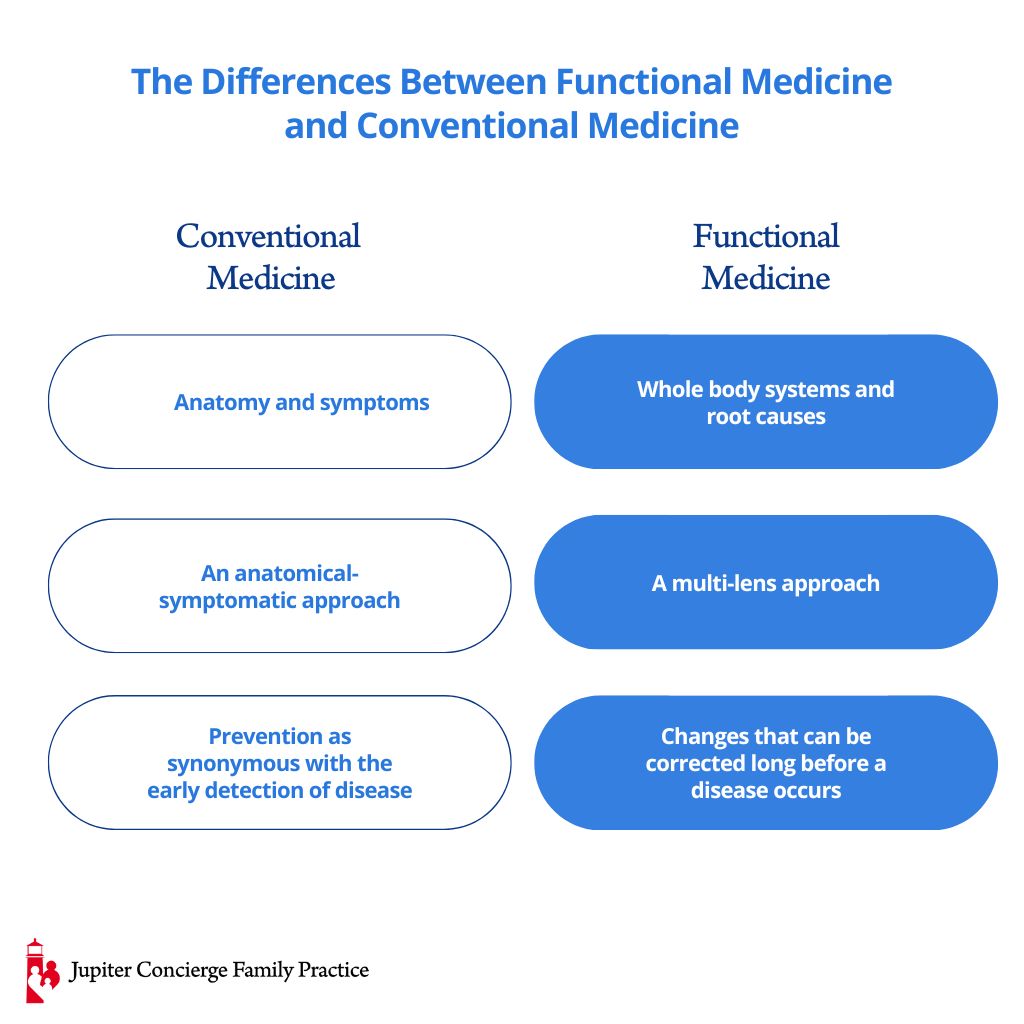
When it comes to the practice of medicine, not all approaches are the same. At Jupiter Concierge Family Practice, we practice both functional and conventional medicine.
But what does that mean? Functional medicine determines both how and why illness occurs, and it restores health by addressing the root causes of disease for each individual.
In this post, we’ll take a look at functional medicine vs. conventional medicine, how the two approaches differ, and the right time for each.
Cancer: A Functional Medicine vs. Conventional Medicine Example
To illustrate the basic differences between functional medicine and conventional medicine, let’s look at how each approaches cancer.
In conventional medicine, a person may go to the doctor for routine blood work and discover they have a certain type of anemia. The doctor then sends them for a bone marrow biopsy, which shows some abnormal (atypical) cells. The patient receives a diagnosis of myelodysplastic syndrome (MDS) and is told the doctors will monitor the condition until it worsens, at which time the patient will undergo a treatment such as chemotherapy.
Functional medicine takes a different approach. In functional medicine, when a doctor discovers these same atypical cells, their goal is to assist the body in trying to heal itself. They make recommendations for specific actions the patient can take to (1) support the immune system as it tries to correct the abnormality and (2) remove any hindrances that keep the body from succeeding.
Functional medicine aims to prevent the disease from getting worse, or at the very least to delay the need for chemotherapy for years – if at all.
Your body has an innate ability to heal itself — if given the proper tools. Functional medicine looks to minimize the things that hinder your body’s healing and to maximize the things that promote it.
Of course, the more advanced a disease is, the more likely a patient will need a more urgent intervention from conventional medicine, such as surgery and/or chemotherapy. Functional medicine isn’t against these measures; it simply seeks to intervene earlier and prevent disease from reaching that stage.
Mind the Gaps: Where Conventional Medicine Needs Functional Medicine
Conventional medicine takes an anatomical-symptomatic approach, while functional medicine takes a physiologic-metabolic-biochemical-genetic systems approach. That’s a lot of words to mean that conventional medicine tends to look at anatomy and symptoms, and functional medicine looks deeply into whole body systems and root causes.
Because of this, though conventional medicine is excellent, it has many gaps in its ability to treat. Those gaps are where functional medicine excels.
Based on the hyphens alone, you can see that functional medicine operates from a multi-lens approach. We consider physiology, metabolism, biochemistry, and genetics, and we look at the body as a whole. This layered view offers an alternative paradigm to conventional medicine’s typical “name it, blame it, tame it” methodology.
Name It, Blame It, Tame It
In conventional medicine’s anatomical-symptomatic approach, physicians want to apply a name to a person’s collection of symptoms, blame that thing for the symptoms, and then treat what they’ve named. Here’s an example of what that often looks like:
Patient: I have miserable knee pain. Please help.
Conventional Doctor: So sorry to hear that. [Proceeds with follow-up questions and a physical exam.]
Conventional Doctor: You have osteoarthritis. I’m going to prescribe an anti-inflammatory medication.
[End Scene]
When the patient came to the conventional doctor with uncomfortable symptoms, the doctor assessed those symptoms, named them a certain condition, and recommended treatment to curtail the discomfort the condition caused.
But functional medicine looks further.
In the same scenario, a functional medicine doctor may still prescribe the anti-inflammatory to relieve the patient’s immediate discomfort. But they won’t stop there.
Because functional medicine unearths root causes, the physician will search for the source of the inflammation. For example, perhaps the patient is experiencing an inflammatory response to gluten that manifests in their knee. In that case, getting rid of the gluten gets rid of the miserable knee pain, and the medication is no longer necessary.
 True Prevention
True Prevention
Functional medicine fills a critical void in the medical world: prevention.
Conventional medicine typically looks at prevention as synonymous with the early detection of disease, the idea being that early detection means a higher likelihood of successful treatment.
Functional medicine, however, looks for changes that can be corrected long before a disease occurs. Rather than managing a developed disease, we intervene earlier to change the body’s course and avoid disease altogether.
For example, conventional medicine relies on mammography to catch breast cancer early enough for effective treatment. Functional medicine promotes the immune system to lower the risk of developing cancer in the first place.
Conventional medicine tests for coronary artery disease (CAD) and elevated cholesterol levels. Functional medicine looks for the inborn errors of metabolism (i.e., genetic predisposition) and signs of fatty acid oxidation that can lead to CAD. We then strategically address those risk factors to lower the probability of developing CAD.
Living Life: The Bottom Line
The functional medicine approach to healthcare puts much more control back into the patients’ hands. They’re able to get involved earlier in their health and avoid many negative outcomes by implementing preventative measures. Expensive (and inconvenient) emergency medical care for acute crises like heart attacks, asthma, and stroke become less likely.
Functional medicine focuses on giving your specific, individualized immune system the things it needs to fight whatever you’re facing. It teaches you ways to minimize the dysfunction that leads to disease first — and then uses conventional treatments when or if necessary.

Dr. David Rosenberg
Dr. Rosenberg is a board-certified Family Physician. He received his medical degree from the University of Miami in 1988 and completed his residency in Family Medicine at The Washington Hospital in Washington, Pennsylvania in 1991. After practicing Emergency Medicine at Palm Beach Gardens Medical Center for two years, he started private practice in Jupiter, in 1993. He is an avid baseball fan and Beatles fanatic, since he was 8 years old. He has been married to his wife, Mary, since 1985 and has three grown children.
David completed additional studies at Mercer University, Macon, Georgia and obtained a BS in Chemistry in 1983.
“My interests include tennis, snow skiing, Pilates and self-development.”
